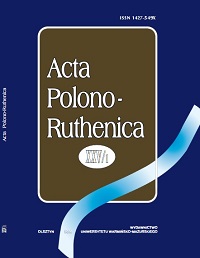Другие берега Владимира Набокова в перспективе геопоэ-тики первой волны эмиграции
Vladimir Nabokov’s Other shores in perspective of the first wave of emigration
Author(s): Svetlana GarzianoSubject(s): Language and Literature Studies, Studies of Literature, Russian Literature, Philology, Theory of Literature
Published by: Wydawnictwo Uniwersytetu Warmińsko-Mazurskiego w Olsztynie
Keywords: Vladimir Nabokov; Other Shores; geopoetics; autobiographical poetics; exile; Russian emigration;
Summary/Abstract: The starting point of the proposed considerations is Mikhail Bakhtin’s notion of genre, according to which genre of an utterance presupposes a particular kind of existence in reality and a special relationship with the recipient. Nabokov’swork A LetterThat Never Reached Russia is a model short story in this respect. Its protago-nist – the author of the eponymous Letter, topicalizes the writer’s situation in exile and takes under consideration both being as well as existential (bytijnyj) aspect of emigration. It is achieved using a twofold strategy. First of all, the hero-writer uses a trick specific to Nabokov himself: he poeticizes Berlin’s space and, with the power of imagination, transforms being (everyday existence), the manner of inhabiting the Earth (Heidegger), emphasizing the role of the spiritual aspect of human existence as a source of happiness. Secondly, choosing the epistolary genre – a form of intimate expression – is also a kind of strategy that allows familiarizing an alien reality and actualizing the “trace” of the past in a solitary everyday life in exile.Vladimir Nabokov’s autobiography Other Shores written in Russian and edited in 1954 by an émigré publishing house serves as a good example for considering the concept of geopoetics based on the example of the cultural and historical phenome-non of the first wave of emigration. The paper intends to study the poetics of Nabokov’s autobiography, which is not only laid down in the semantic meanings of the title of the work but also can be traced in the structure of the text and its structuring thematic motifs (travels in childhood, the image of Russia, emigration, exile, etc.).
Journal: Acta Polono-Ruthenica
- Issue Year: 1/2020
- Issue No: XXV
- Page Range: 47-60
- Page Count: 14
- Language: Russian

